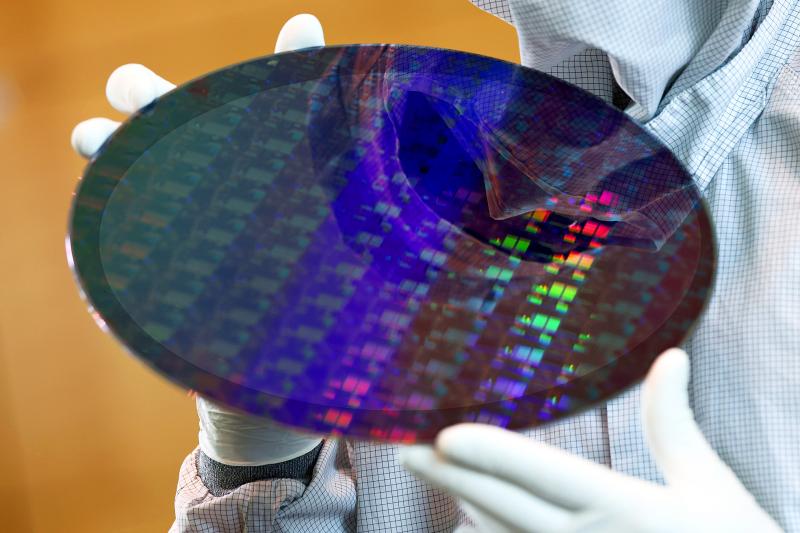The production value in Taiwan’s semiconductor industry this year is expected to soar 31.8 percent from last year to NT$3.6 trillion (US$129 billion), outpacing 10.1 percent growth in the global semiconductor industry, market researcher the Market Intelligence and Consulting Institute (產業情報研究所) said yesterday.
The Taipei-based researcher attributed the strong outlook for the local semiconductor industry to demand for chips used in notebook computers amid a COVID-19 pandemic-induced stay-at-home economy, as well as emerging applications from 5G and artificial intelligence to automotive electronics.
Production in the foundry segment, a pillar of Taiwan’s semiconductor industry, is to expand 20 percent annually to NT$1.9 trillion, driven by higher chip prices as demand continues to outstrip supply, the institute said.

Photo: Bloomberg
Chipmakers would increase prices, passing on increases in manufacturing costs, it said.
“Semiconductor shortages have become a new global norm,” said Cheng Kai-an (鄭凱安), a senior industry analyst at the institute.
“It has become a new business model for foundry companies to ink long-term supply agreements and collect prepayments,” Cheng said in a statement. “Foundry companies are raising prices to reflect higher costs and to boost gross margin. Hiking chip prices will also help avert overbooking, which could lead to supply-demand imbalance.”
For suppliers of DRAM and flash memory chips, prices are to peak in the second half of this year, leaving little room for further upticks, he said.
Taiwan Semiconductor Manufacturing Co (TSMC, 台積電), the world’s biggest foundry service provider, said that it expects its revenue to expand more than 20 percent this year from last year.
TSMC has reportedly raised prices by 10 to 20 percent for new orders.
Local chip testing and packaging service providers are to increase product value by 25 percent this year from last year, benefiting from strong demand, price increases and supply constraints, the institute said.
On top of that, some local companies are to receive orders transferred from peers, as some plants were forced to halt production due to COVID-19 restrictions in Malaysia, the market researcher said.
Chip designers, led by MediaTek Inc (聯發科), are expected to report growth of 33 percent year-on-year this year to cross the NT$1 trillion mark for the first time, to NT$1.1 trillion, it said.
Demand is rising for a wide range of chips, helping to propel revenue growth, Cheng said.
However, supply of microcontroller units, power management ICs and radio frequency ICs might remain tight due to a capacity squeeze at foundries, he said.
The institute said that it expects a global chip crunch to continue next year and in 2023, as it takes time for chipmakers to ramp up new production and for governments to build local supply chains.
Over the next three years, the compound annual growth rate of production value in Taiwan’s foundry sector is expected to be 10.5 percent, it said.
Chip designers and memorychip makers are expected to grow 7.9 percent and 7.5 percent respectively, while chip testers and packagers would expand 7.2 percent, it said.

POWERING UP: PSUs for AI servers made up about 50% of Delta’s total server PSU revenue during the first three quarters of last year, the company said Power supply and electronic components maker Delta Electronics Inc (台達電) reported record-high revenue of NT$161.61 billion (US$5.11 billion) for last quarter and said it remains positive about this quarter. Last quarter’s figure was up 7.6 percent from the previous quarter and 41.51 percent higher than a year earlier, and largely in line with Yuanta Securities Investment Consulting Co’s (元大投顧) forecast of NT$160 billion. Delta’s annual revenue last year rose 31.76 percent year-on-year to NT$554.89 billion, also a record high for the company. Its strong performance reflected continued demand for high-performance power solutions and advanced liquid-cooling products used in artificial intelligence (AI) data centers,

SIZE MATTERS: TSMC started phasing out 8-inch wafer production last year, while Samsung is more aggressively retiring 8-inch capacity, TrendForce said Chipmakers are expected to raise prices of 8-inch wafers by up to 20 percent this year on concern over supply constraints as major contract chipmakers Taiwan Semiconductor Manufacturing Co (TSMC, 台積電) and Samsung Electronics Co gradually retire less advanced wafer capacity, TrendForce Corp (集邦科技) said yesterday. It is the first significant across-the-board price hike since a global semiconductor correction in 2023, the Taipei-based market researcher said in a report. Global 8-inch wafer capacity slid 0.3 percent year-on-year last year, although 8-inch wafer prices still hovered at relatively stable levels throughout the year, TrendForce said. The downward trend is expected to continue this year,

Vincent Wei led fellow Singaporean farmers around an empty Malaysian plot, laying out plans for a greenhouse and rows of leafy vegetables. What he pitched was not just space for crops, but a lifeline for growers struggling to make ends meet in a city-state with high prices and little vacant land. The future agriculture hub is part of a joint special economic zone launched last year by the two neighbors, expected to cost US$123 million and produce 10,000 tonnes of fresh produce annually. It is attracting Singaporean farmers with promises of cheaper land, labor and energy just over the border.

US actor Matthew McConaughey has filed recordings of his image and voice with US patent authorities to protect them from unauthorized usage by artificial intelligence (AI) platforms, a representative said earlier this week. Several video clips and audio recordings were registered by the commercial arm of the Just Keep Livin’ Foundation, a non-profit created by the Oscar-winning actor and his wife, Camila, according to the US Patent and Trademark Office database. Many artists are increasingly concerned about the uncontrolled use of their image via generative AI since the rollout of ChatGPT and other AI-powered tools. Several US states have adopted